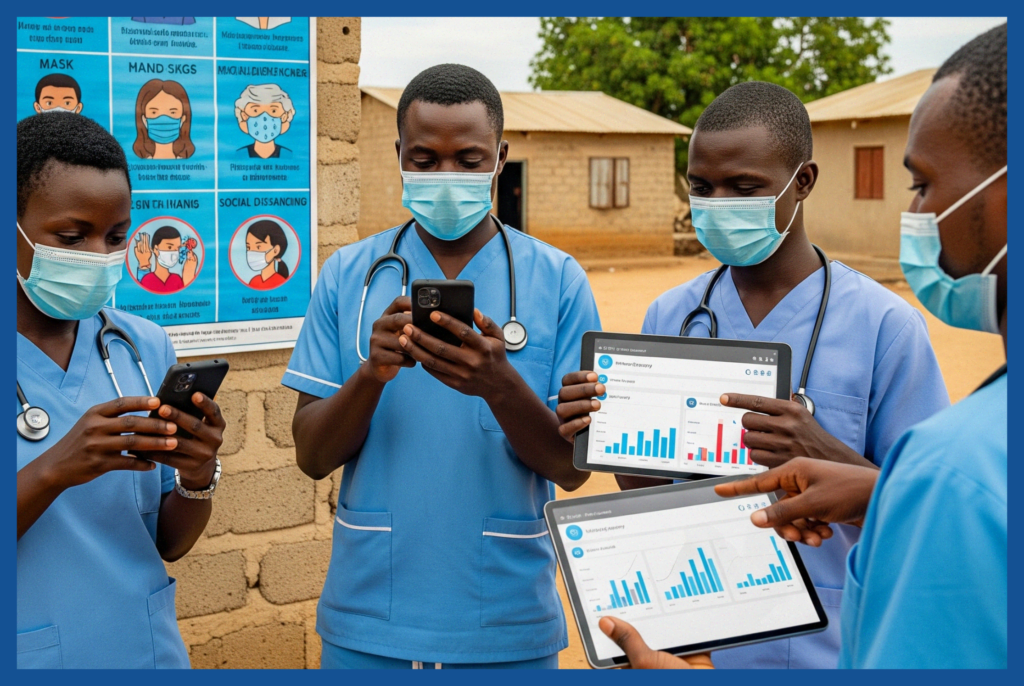RapidPro Gambia: Strengthening COVID‑19 Response with SMS Data

RapidPro Gambia: Messaging at the Speed of a Crisis
In emergencies, timely, trustworthy information is critical. When COVID-19 reached The Gambia in early 2020, it threatened already-strained health systems and core public services. Conventional channels for outreach and data capture couldn’t keep pace with a rapidly evolving outbreak. RapidPro Gambia stepped in to close that gap, delivering fast, practical tools for communication and monitoring.
Launched in May 2020 by UNICEF and the Gambian Ministry of Health, RapidPro served as a real-time SMS hub to collect, track, and respond to COVID-19 data. Frontline staff used simple text messages to share essential updates, gather feedback from communities, and sustain vital services.
While RapidPro.app did not power this particular deployment, the results underscore the platform’s potential—especially when hosted through expert-managed services like RapidPro.app. Focused on helping NGOs and governments scale impactful communications, RapidPro.app provides secure, scalable, ready-to-launch infrastructure for users worldwide.
What Is RapidPro—and Why Does It Work?
RapidPro is an open-source platform for interactive messaging and live data collection across SMS, USSD, social channels, and chatbots. It is widely adopted by NGOs, governments, and UN agencies to reach people at scale, particularly in low-connectivity contexts.
Core advantages include:
-
Live data capture with instant visualization
-
Broad reach via basic mobile phones (no internet required)
-
Two-way engagement for questions, feedback, and follow-ups
-
Integrations with external systems (databases, CRMs, health platforms)
-
Multilingual workflows and local customization
RapidPro in The Gambia: Data-Driven Response
By May 2020, Gambian authorities needed a way to track transmission and keep essential services running. With UNICEF’s support, RapidPro Gambia was configured to:
-
Collect real-time information on symptoms and prevention behaviors
-
Send targeted prevention messages and alerts via SMS
-
Enable remote oversight of health facilities
-
Power decision-making with dashboards and dynamic reporting
The system quickly became a backbone of the country’s digital health response, giving leaders live visibility into community needs and frontline capacity.
How Health Workers Used SMS on the Front Line
Across The Gambia, health staff relied on SMS to:
-
Report suspected COVID-19 cases
-
Track PPE, medicines, and other supplies
-
Receive remote training and technical support
-
Distribute updated guidance instantly
Because RapidPro is SMS-first, even households without internet access stayed informed—reducing misinformation and strengthening confidence in public health directives.
Safeguarding Essential Services Beyond COVID-19
Beyond outbreak control, RapidPro Gambia helped maintain:
-
Maternal and child health follow-up
-
Routine immunization schedules
-
Supply-chain oversight
-
Education alerts and notifications
By streamlining communication among ministries, providers, and citizens, the platform helped limit secondary impacts of the pandemic.
Why Host with RapidPro.app?
RapidPro’s effectiveness depends on robust, secure hosting. RapidPro.app adds value with:
Enterprise-Grade Security & Compliance
-
End-to-end encryption
-
GDPR-compliant hosting options
-
Regular security assessments
Rapid, Flexible Deployment
-
Up and running in under 24 hours
-
Choice of cloud or on-premises
-
Elastic infrastructure that scales with demand
Global Reach & Language Support
-
Interfaces available in multiple languages
-
Full Unicode support across scripts
-
Built-in translation and localization workflows
Expert Support & Integrations
-
24/7 technical assistance
-
Seamless connections to CRMs and health systems
-
Tailored onboarding and training
Lessons from The Gambia
-
Real-time data enables targeted, timely decisions
-
SMS helps bridge the digital divide
-
Government–UN collaboration is pivotal
-
Flexible, scalable systems preserve continuity
Conclusion: A Blueprint for Future Emergencies
RapidPro Gambia demonstrates how straightforward tools like SMS, powered by a smart messaging platform, can save lives during crises. It also highlights the importance of a reliable hosting and support partner to unlock the full capabilities of RapidPro.
At RapidPro.app, we help organizations deploy faster, safer, and at scale. Whether you’re an NGO, UN agency, or government institution, we provide the infrastructure and expertise to elevate your communication strategy—without the technical overhead.
Ready to Amplify Your Impact with RapidPro?
Launch a secure, high-performance RapidPro instance today—minus the complexity. 👉 Get started now at RapidPro.app
FAQs: RapidPro Gambia & RapidPro.app
What is “RapidPro Gambia”?
The term refers to The Gambia’s deployment of RapidPro during COVID-19, used by health authorities and frontline workers for communication and data collection.
How did RapidPro support The Gambia’s COVID-19 response?
It enabled real-time SMS data collection, supported public messaging, monitored supply availability, and helped sustain essential health services throughout the pandemic.
Was RapidPro.app the provider for The Gambia’s rollout?
No. RapidPro.app did not deploy that instance. The case illustrates how organizations can benefit from a professional hosting partner like RapidPro.app.
Why should NGOs consider RapidPro.app for hosting?
They gain secure, rapid deployment; proactive, round-the-clock support; comprehensive integrations; and expert guidance end-to-end.
Can RapidPro be applied outside the health sector?
Absolutely. It’s used across education, agriculture, emergency management, civic engagement, and more.
